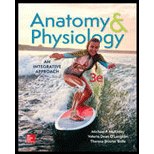
Anatomy & Physiology
3rd Edition
ISBN: 9781259398629
Author: McKinley, Michael P., O'loughlin, Valerie Dean, Bidle, Theresa Stouter
Publisher: Mcgraw Hill Education,
expand_more
expand_more
format_list_bulleted
Question
Chapter 13.6, Problem 30WDL
Summary Introduction
To explain:
The part of brain which is connected by the middle cerebellar peduncles from cerebellum.
Concept introduction:
The central organ of the nervous system is known as the brain. There are four major regions of the brain, namely cerebellum, cerebrum, brainstem, and the diencephalon. The cerebellum is involved in producing control over the muscles and also stores the memories of the movement patterns.
Expert Solution & Answer
Want to see the full answer?
Check out a sample textbook solution
Students have asked these similar questions
The axons of the corticobulbar tract terminate in the motor nuclei of which cranial nerves?
Differentiate between Cerebrum and Cerebellum.
List in tabular form three distinguishing features between cerebrum and cerebellum.
Chapter 13 Solutions
Anatomy & Physiology
Ch. 13.1 - Prob. 1LOCh. 13.1 - Prob. 1WDLCh. 13.1 - Prob. 2LOCh. 13.1 - Prob. 3LOCh. 13.1 - Prob. 4LOCh. 13.1 - How does the neural plate form a neural tube?Ch. 13.1 - Identify the five secondary vesicles, and list the...Ch. 13.1 - Prob. 5LOCh. 13.1 - Prob. 4WDLCh. 13.2 - Prob. 6LO
Ch. 13.2 - LEARNING OBJECTIVE
7. Describe the four cranial...Ch. 13.2 - Prob. 1WDTCh. 13.2 - From deepest (closest to the brain) to superficial...Ch. 13.2 - Prob. 6WDLCh. 13.2 - Prob. 8LOCh. 13.2 - Prob. 7WDLCh. 13.2 - LEARNING OBJECTIVE
9. Explain the three functions...Ch. 13.2 - LEARNING OBJECTIVE
10. Trace the circulation of...Ch. 13.2 - Prob. 8WDLCh. 13.2 - Prob. 9WDLCh. 13.2 - Prob. 11LOCh. 13.2 - Prob. 12LOCh. 13.2 - How does the blood-brain barrier protect nervous...Ch. 13.3 - LEARNING OBJECTIVE
13. Describe the anatomic...Ch. 13.3 - Prob. 14LOCh. 13.3 - Prob. 2WDTCh. 13.3 - Prob. 11WDLCh. 13.3 - What is the function of the corpus callosum?Ch. 13.3 - Prob. 15LOCh. 13.3 - Prob. 13WDLCh. 13.3 - Prob. 16LOCh. 13.3 - Prob. 17LOCh. 13.3 - Prob. 18LOCh. 13.3 - Prob. 19LOCh. 13.3 - Prob. 3WDTCh. 13.3 - Prob. 14WDLCh. 13.3 - Prob. 15WDLCh. 13.3 - Prob. 16WDLCh. 13.3 - Prob. 20LOCh. 13.3 - Prob. 17WDLCh. 13.3 - Prob. 21LOCh. 13.3 - Prob. 22LOCh. 13.3 - Prob. 18WDLCh. 13.3 - Prob. 19WDLCh. 13.3 - Prob. 23LOCh. 13.3 - Prob. 20WDLCh. 13.4 - Prob. 24LOCh. 13.4 - Prob. 25LOCh. 13.4 - Prob. 21WDLCh. 13.4 - Prob. 26LOCh. 13.4 - Prob. 4WDTCh. 13.4 - What is the general function of the thalamus?Ch. 13.4 - Prob. 27LOCh. 13.4 - Prob. 23WDLCh. 13.5 - Prob. 28LOCh. 13.5 - Prob. 29LOCh. 13.5 - LEARNING OBJECTIVE
30. Explain the involuntary...Ch. 13.5 - What is the function of the substantia nigra, and...Ch. 13.5 - Prob. 25WDLCh. 13.5 - LEARNING OBJECTIVE
31. Identify the respiratory...Ch. 13.5 - Prob. 32LOCh. 13.5 - Prob. 26WDLCh. 13.5 - Prob. 33LOCh. 13.5 - Prob. 34LOCh. 13.5 - Prob. 5WDTCh. 13.5 - Prob. 27WDLCh. 13.5 - WHAT DID YOU LEARN?
28 What are the main autonomic...Ch. 13.6 - Prob. 35LOCh. 13.6 - Prob. 36LOCh. 13.6 - Prob. 29WDLCh. 13.6 - Prob. 30WDLCh. 13.6 - Prob. 37LOCh. 13.6 - Prob. 31WDLCh. 13.7 - LEARNING OBJECTIVE
38. Describe the main functions...Ch. 13.7 - Prob. 39LOCh. 13.7 - Prob. 32WDLCh. 13.7 - Prob. 33WDLCh. 13.7 - Prob. 40LOCh. 13.7 - Prob. 41LOCh. 13.7 - How is the reticular activating system related to...Ch. 13.8 - Prob. 42LOCh. 13.8 - Prob. 35WDLCh. 13.8 - Prob. 43LOCh. 13.8 - Prob. 36WDLCh. 13.8 - Prob. 44LOCh. 13.8 - Prob. 45LOCh. 13.8 - What are the main differences between non-REM and...Ch. 13.8 - Prob. 46LOCh. 13.8 - Prob. 47LOCh. 13.8 - Prob. 38WDLCh. 13.8 - Prob. 48LOCh. 13.8 - Prob. 49LOCh. 13.8 - Prob. 39WDLCh. 13.8 - Prob. 50LOCh. 13.8 - Prob. 40WDLCh. 13.8 - Prob. 51LOCh. 13.8 - How is the Wernicke area involved in language...Ch. 13.9 - Prob. 52LOCh. 13.9 - Prob. 53LOCh. 13.9 - Prob. 42WDLCh. 13 - _____ 1. Which cranial nerve is responsible for...Ch. 13 - Prob. 2DYBCh. 13 - _____ 3. Which of these is the least likely to...Ch. 13 - Prob. 4DYBCh. 13 - Prob. 5DYBCh. 13 - Prob. 6DYBCh. 13 - Prob. 7DYBCh. 13 - Prob. 8DYBCh. 13 - Prob. 9DYBCh. 13 - Prob. 10DYBCh. 13 - Prob. 11DYBCh. 13 - Prob. 12DYBCh. 13 - Prob. 13DYBCh. 13 - Prob. 14DYBCh. 13 - Prob. 15DYBCh. 13 - Describe the pathway by which the pressure applied...Ch. 13 - Prob. 17DYBCh. 13 - During surgery to remove a tumor from the...Ch. 13 - What is the difference between apraxia of speech...Ch. 13 - Prob. 20DYBCh. 13 - Prob. 1CALCh. 13 - Prob. 2CALCh. 13 - Prob. 3CALCh. 13 - Why did Shannon experience the problems with her...Ch. 13 - Prob. 5CALCh. 13 - Peyton felt strange when she awoke one morning....Ch. 13 - Prob. 3CSLCh. 13 - During a robbery at his convenience store, Dustin...
Knowledge Booster
Learn more about
Need a deep-dive on the concept behind this application? Look no further. Learn more about this topic, biology and related others by exploring similar questions and additional content below.Recommended textbooks for you
 Human Physiology: From Cells to Systems (MindTap ...BiologyISBN:9781285866932Author:Lauralee SherwoodPublisher:Cengage Learning
Human Physiology: From Cells to Systems (MindTap ...BiologyISBN:9781285866932Author:Lauralee SherwoodPublisher:Cengage Learning Fundamentals of Sectional Anatomy: An Imaging App...BiologyISBN:9781133960867Author:Denise L. LazoPublisher:Cengage Learning
Fundamentals of Sectional Anatomy: An Imaging App...BiologyISBN:9781133960867Author:Denise L. LazoPublisher:Cengage Learning



Human Physiology: From Cells to Systems (MindTap ...
Biology
ISBN:9781285866932
Author:Lauralee Sherwood
Publisher:Cengage Learning

Fundamentals of Sectional Anatomy: An Imaging App...
Biology
ISBN:9781133960867
Author:Denise L. Lazo
Publisher:Cengage Learning
Nervous System - Get to know our nervous system a bit closer, how does it works? | Neurology; Author: FreeMedEducation;https://www.youtube.com/watch?v=6O-0CVAgaEM;License: Standard youtube license